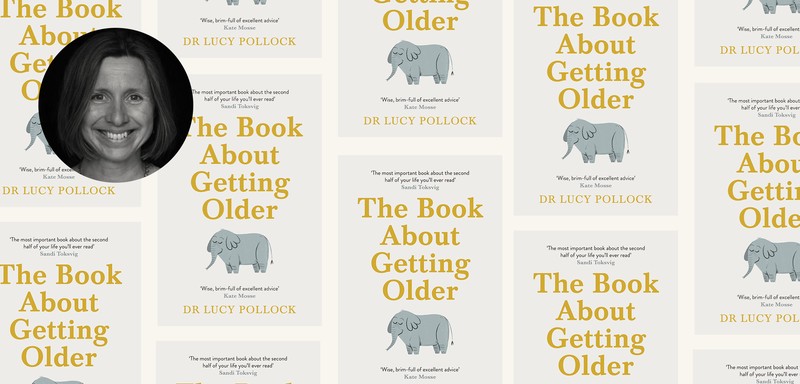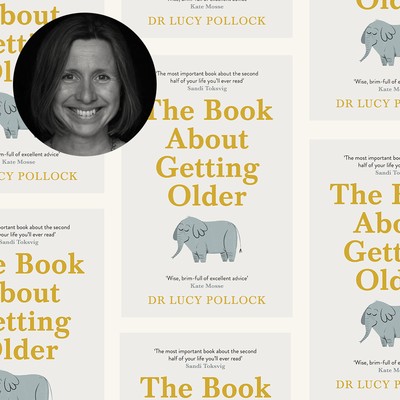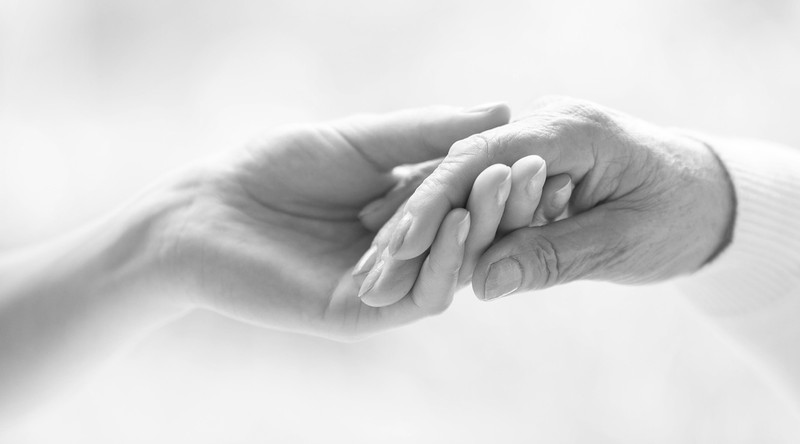

What You Need To Know About Getting Older
For about 25 years, the power has been in the wrong place when it comes to getting older. I'd only just started training in geriatric medicine when I had a couple of really important conversations with an older lady who didn’t want to take the tablets I’d suggested for her. We had a very forthright conversation and she was very clear about her views but that was juxtaposed with a separate conversation I had with a family of somebody who couldn't speak for themselves. I could see there were so many things they should be asking but couldn't. I knew what the questions were but they either didn't have the right language or the right information, or the permission to ask them. So, for quite a long time, I've been working with people to shift the information into the right place and give them the power to take some control of their own situation.
Most people don’t understand what they mean by saying they to want to die of natural causes. Really, the phrase ‘natural causes’ means anything that isn’t violent or accidental – so heart attacks, cancer, dementia… the list goes on. These days, most people die quite slowly – which sounds harsh but I don’t want it to; it only means that many people don’t have a sudden stroke or are hit by a bus. It’s more likely they’ll develop several different medical problems, which require multiple medications and that lead to increasing frailty – which is actually what people feel very anxious about, understandably.
What people really mean is they want to be alive and well when they go. Part of my book is about how to achieve that as much as possible – i.e. how do you maintain your independence and your strength and your wellbeing into later old age? We call that plan A. And then other parts of the book are about plan B because, in the end, for many of us, we will be living with increasing frailty or we will have parents who are in that situation. Ultimately, the book has a positive message – it’s about how to handle all these circumstances in the best way possible and to prepare yourself for what might come.
We need permission to talk about things that might be uncomfortable. Quite a lot of my older patients are very relieved to have a conversation about what their hopes and expectations actually are and what their fears are. And lots of my patients are not afraid of being dead but they are afraid of the process of dying – and they want to talk about it. Often, they can't talk about it to their family because they don't want to upset them or they try to talk to their family, and their family often shuts the conversation down. I think we’re sometimes guilty of making assumptions about what somebody's hopes and wishes are and what their goals are.
Older people need to be listened to. Modern medicine can do a great many things and we can end up burdening people with treatments that they don't want. And we make people feel guilty and their families feel guilty if they decide to step off that path that we, the medics, have laid for them. We don't always give people the opportunity to have those honest conversations and, when you do, they’re brilliant. I know it sounds odd, but they can also be some of the happiest conversations – because you’re telling the truth.
Dementia has definitely become more common – mainly because people are living longer. It’s an illness of aging but thankfully we are getting better at talking about it. It’s not really hereditary – which is one of the first myths to dispel – and there are actually lots of things you can do in younger life to stave it off, like not smoking, drinking in moderation and taking regular exercise. Also, reading and educating yourself makes a big difference. Sadly, there is a strong socioeconomic association for dementia, but obviously people at the top end of the scale are not protected from the deterioration by their privilege, even if care funding is made easier.
It’s very hard to prepare ourselves for the possibility of having dementia. It’s important not to dwell on it because it can become overwhelming and all-consuming, and that’s not any way to counteract the problem. You just need to make sure you've got some practical things in hand. A good new year's resolution would be to get your lasting power of attorney sorted out for your finance, health and wellbeing. Talk to the person that you're going to hand that power to and make sure they know what your wishes are. When you know you've done your homework, it’s an amazing sense of relief. Plus, it’ll protect you in all sorts of circumstances, not just for dementia.
A dementia patient’s standard of life is often judged by someone else’s standards. That’s something I’ve learnt through my work – often, a dementia patient’s goals and wishes change, and they move into a place of acceptance about their life. But the family around them struggle to see any quality in it. To anyone frightened of the idea, I’d say it’s still possible to be contented and entertained. It’s just that the things that make you smile are different now.

I wish more people had a pragmatic approach and took initiative with advanced care plans. It becomes so essential in older age, and everyone should be afforded the opportunity to make one because it’s not about denying people treatment; it’s about giving people a choice. You need to be allowed to say what your wishes are and it's no good putting it off, because when an emergency happens, you might not be in a position to explain your wishes anymore. Being honest with your family is the first step and writing it down is the second. So many people never talk about these things at all and their families are left completely bewildered.
An advanced care plan will include a resuscitation decision. But it can also include quite a lot of other things, such as your wish not to go to hospital in an emergency if you’re older or frailer. You are allowed to say that you’d rather be kept comfortable at home with the people you love or that are familiar to you. It’s good to see more and more people starting to have this conversation.
A great example of the imbalance of power in elderly care is my patient, Albert. He had already been in hospital for a long time and was then discharged to a nursing home. Within a matter of weeks, he was back in hospital again. I’d not met him before, so I spent a bit of time with him to find out what had been happening and little bit about his life, both personally and medically. It was clear Albert had been subjected to an enormous number of tests, investigations and treatments that were of no benefit to him and that actually had caused him considerable suffering. At no point had anybody stopped to ask what his wishes would have been. He wasn't able to speak for himself. He had dementia and his family had only been ‘kept informed’. What we really needed to do was ask what Albert’s goal in all of this was. Looking at him, he probably only had a year to live, maybe less, and that time should have been spent with his friends and family, not doing endless tests.
So much of our treatment of the elderly is framed around whether somebody has ‘capacity’. But the issue comes in making blanket statements about whether somebody does or doesn’t have capacity without taking into account what the decision is they're being asked to make. The other issue is there's a lot of confusion about whether somebody has capacity, or just a strong opinion. People might have a strong view, but they might not be able to weigh up their own situation because their memory is so poor that they don't know what the situation really entails. In my work, you realise people have a perception of themselves that’s rooted in what they were, say five or ten years ago, rather than what the circumstances are in the present day. That said, even if people don’t have capacity, I do believe their opinion should be respected.
All through our lives, we make decisions that are unwise or unsafe – but nobody questions whether we should be allowed to do that. Sometimes, we’re overprotective of older people because they're frail or have dementia, when actually we should be respecting their wish to live as they like to live but, sometimes, that is very hard for families. You want loved ones to be safe but sometimes you have to step back and allow them to take risks. You’re actually doing the right thing. You can also rest assured that there is a process that’s followed, even if it’s not as clear cut as you'd like it to be and sometimes you have to let the process play out. Often, people reach a place of mutual agreement, even though it can place huge burden on the care system.
In my experience, a lot of older people aren’t afraid of death. Sure, it's not true for everybody and I do have patients in their late 90s who are extremely upset by the idea that they may not have much time left. But for most people, they’re not afraid of what's going to happen after they have died. They are anxious about the process. I think it’s because, as a society, we’ve separated our death from our life too much. A hundred years ago, most people died at home and their families were aware of what that process was like. Nowadays, many people have never been with somebody who is dying and there is a very good campaign being led by some wonderful people in palliative care to remind us what a normal death should look like.
Ageing and dying is full of weighty and sometimes quite frightening or gloomy things but, in reality, my job is full of laughter – especially once we've talked about the difficult stuff. My advice is plan it and park it. Once you’ve had that conversation, you set it aside and move on with all the joyous stuff. Go and have fish and chips by the beach, talk to your grandchildren, go for a walk in the frosty sunshine. There’s so much that is fun in life and there’s no need to stop having fun as you get older.
My main fear about the elderly population is ‘othering’ them. I have a real concern about the drive towards building communities that separate older people from younger people. It’s such a bad idea – not only are young people very good for old people, but actually old people are very good for young people, too. Younger people are under so much pressure these days – mainly because of perfection – and FOMO is a real issue. But older people know that life is not like that. They have a perspective and can see that life is a rollercoaster with all its ups and downs. That is a very important message and it would be a great mistake to lose those connections. You only have to spend a very short amount of time with an older person to realise that they're a human being. All of these human interactions are very, very important.
‘The Book About Getting Older: The essential comforting guide to ageing with wise advice for the highs and lows’ by Lucy Pollock is out now and published by Penguin. Buy it here.
DISCLAIMER: We endeavour to always credit the correct original source of every image we use. If you think a credit may be incorrect, please contact us at info@sheerluxe.com.

